Belgian Official Resigns Over Inviting Hardline Tehran Mayor To Brussels
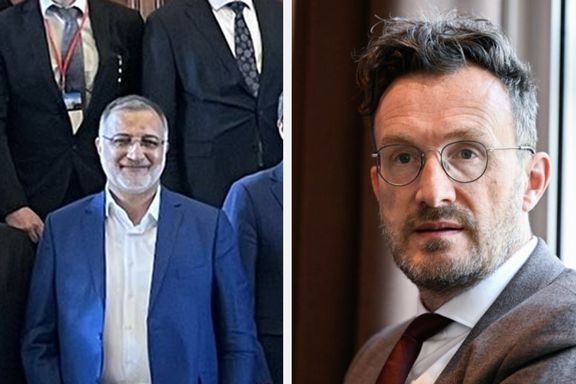
A senior Belgian official has resigned from his post following the pressure that followed his invitation of Tehran’s mayor, a hardline regime insider.

A senior Belgian official has resigned from his post following the pressure that followed his invitation of Tehran’s mayor, a hardline regime insider.
Pascal Smet, the Secretary of State for European and International Relations for the city council of the Belgian capital Brussels, announced his resignation at a press conference earlier in the day, saying that one of his employees made the mistake of inviting the Iranian hardliner, Alireza Zakani, the mayor of Tehran.
Zakani was a hardline member of parliament before becoming a candidate in the 2021 presidential election and withdrawing in favor of Ebrahim Raisi. He also served as the head of IRGC’s Student Basij paramilitary forces and had a prominent role in cracking down on students during popular protests in July 1999.
So deep was the controversy, Smet announced his regret in a statement: "I regret that I gave the impression that the Iranian regime is welcome. I assure you that it was not my intention to hurt anyone and that my moral compass is very high. For all these reasons, but mainly because of the accommodation costs, the mistake my employee made, I have decided to resign as Secretary of State."
Darya Safai, a Belgian-Iranian member of the Belgian Parliament, had led the campaign for Smet's resignation. In a tweet on Sunday she said that his stepping down followed days of work by her party to condemn the invitation of an Iranian delegation to the Urban Summit in Brussels.
Safai added that the responsibility lies with the Minister of Foreign Affairs Hadja Lahbib, who issued the visas after individual evaluation. She said her party is set to grill Lahbib this week for not only the invitation but her cooperation with Iranian officials and the prisoner swap deal with Iran that led to release of Iranian diplomat convicted of terrorism, Asadollah Assadi.

An analysis published in Tehran says the conservative are too weak to win the next parliamentary election or even to ensure their survival in the political landscape.
Reformist daily Shargh Online wrote in a political analysis that conservative political figures such as, former parliamentary Speaker and traditional conservative Gholamreza Ali Haddad-Adel and his successor, neo-conservative Mohammad Bagher Ghalibaf are not likely to be able to win the next parliamentary elections in March even if they form a coalition together.
The report said that they might need the support of moderate conservative Ali Larijani, another former Speaker to make that form a successful alliance. Only then they might be able to defeat the powerful hardline conservative front led by former IRGC General Sadeq Mahsouli one of the leaders of Paydari Party, which other conservatives regard as a “radical” group.
The analysis loosely characterised Ali Larijani as “the new right,” Ghalibaf and Haddad Adel as “moderate right” and Paydari as “radical.” This characterisation is interesting and shows how the far right has radically distanced itself from the main body of the conservative camp, so that all others look relatively moderate when they are compared with Paydari.
Such a tripartite alliance, if ever formed, may be able to put an end to the country’s political impasse and save the Islamic Republic from an even bigger political crisis, the analysis concluded.
However, the report ignored the fact that without opening up some space for the regime’s ‘reformists’ the political impasse will not end.
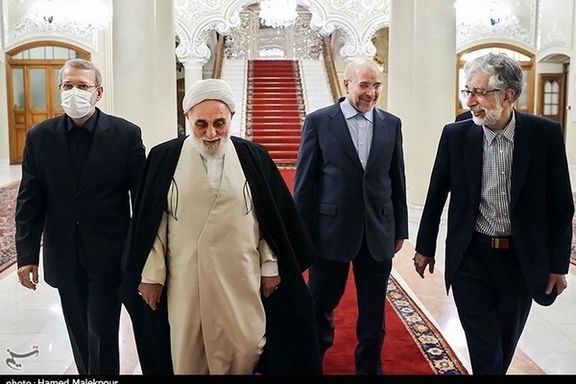
The Coalition Council of the Revolutionary Forces (Persian acronym: SHANA) which represents traditional conservatives, held a meeting on Thursday but like many other such meetings by political groups and parties they did not publish any photos of the gathering for the likely reason of a low turnout.
The monopoly of power by hardliners in both the executive and the parliament has dissuaded more moderate conservatives from a serious political agenda as they know that forming coalitions and will not work unless they have the overt support of Supreme Leader Ali Khamenei and his aides.
According to Shargh, politicians such as Ghalibaf and Haddad-Adel fear that without Larijani joining them, the radicals might kick them out of political competitions in the same way they got rid of Larijani in the 2021 presidential elections. However, the article did elaborate on why Larijani can help the other two politicians, who apart from everything else, happen to be Khamenei’s relatives.
All other conservative alliances during previous elections either fell apart before the voting day or they were faced down by the ultra-conservative Paydari in the last minute.
On the other hand, Ali Larijani is not known for having a sizeable following. Members of the Iranian Parliament who worked closely with him have not been observed to defend him after his disqualification by the Guardian Council in 2021. Since then, on the contrary, the Paydari has been gaining more political power in the parliament where it holds the majority, and in President Ebrahim Raisi’s cabinet.
The only factor that can help more moderate conservatives, including Larijani and Haddad-Adel, is the poor record of ultra conservatives both in the cabinet and in parliament, where Ghalibaf as speaker shares the blame.
Both the current economic crisis and repression, with no end in sight, have badly discredited the hardliners, who for the past two years have enjoyed a total monopoly of power.
On the other hand, some political observers in Iran, including the author of Shargh’s analysis, Davoud Heshmati believe the “purification” process that kicked Larijani out of the power circle might also expel Ghalibaf in the next election.
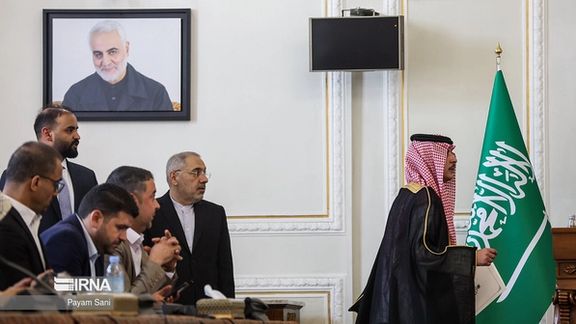
Iranian state media has buried news of the Saudi foreign minister's visit following a diplomatic incident that left the regime red-faced.
Prince Faisal bin Farhan arrived in Tehran on Saturday and immediately held a meeting with his Iranian counterpart Hossein Amir-Abdollahian, followed by a joint press conference where the top Saudi diplomat realized he was standing in front of a picture of IRGC general Qassem Soleimani, Iran’s architect of proxy wars in the Middle East, including arming Yemen’s Houthis against Saudi Arabia.
Prince Faisal immediately requested the venue of the press conference to be changed and the Iranian side complied in a bid not to tarnish the newly revived relations between the two countries after years of tension which isolated the Iranian régime in the region.
Soleimani was killed in an air strike in January 2020 ordered by former US President Donald Trump - a victory for many in the region who saw themselves as victim to his reign of terror.
Farhan later met with President Ebrahim Raisi, though there was almost nothing about the meeting on government news websites on Sunday morning other than a few relatively independent websites which carried the news of the incident at the press conference, including critical comments.
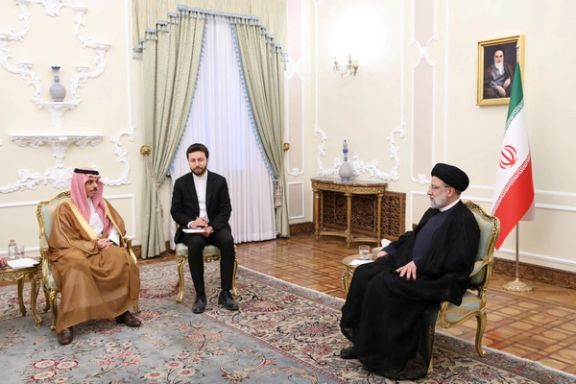
Even in Saudi, the embarrassing incident was avoided, the Saudi Press Agency only carrying a short and formal dispatch from both meetings, essentially saying nothing beyond formal diplomatic statements.
Fararu, a moderate website, simply reported on a tweet by reformist commentator Abbas Abdi, who quipped that if former foreign minister Mohammad Javad Zarif had acquiesced to the Saudi request to move the press conference, hardliners would have raised hell, but because now they are in charge it happened quietly.
“Don’t you feel shame? You stooped yourselves to the level of worthless pawns,” Abdi addressed the hardliners, pointing out that until recently they were chanting Soleimani’s name.
In his meeting with Prince Faisal, Raisi repeated the Islamic Republic’s anti-Israel rhetoric saying, “The Zionist regime is not only the enemy of Palestinians, but also a threat for all Muslims. Normalizing of ties by some countries with this regime not only does not contribute to security, but also contradicts Muslim opinion.”
Saudi Arabia has so far refrained from joining the Abraham Accords and establishing diplomatic ties with Israel, unlike some of its close allies such as Bahrain and the United Arab Emirates.
When in March Riyadh and Tehran announced their agreement to re-establish relations, some believed that Saudi Arabia wanted to create a regional balance in its foreign policy before joining the Abraham Accords. The United States has also been trying to encourage Riyadh, but so far there are no signs of a decision as Iran has encouraged Palestinians to engage in military confrontations with Israel since March.
The semi-official ILNA news website in Tehran, one of the few to report on the topic, quoted al Farhan as telling Raisi that “some countries in the world do not want peace and progress in the region. With emerging goodwill between Iran and Saudi Arabia and in the Muslim world, unlimited achievements become possible, and it also guarantees that no foreign countries interfere in the region.”
However, in the joint press conference the Saudi top diplomat sent a clear message to Iran regarding his country's expectations from the détente.
"I would like to refer to the importance of cooperation between the two countries on regional security, especially the security of maritime navigation... and the importance of cooperation among all regional countries to ensure that it is free of weapons of mass destruction," Prince Faisal said

Iran’s government film watchdog has warned producers that if they give roles to actresses who have removed their hijab in public, their films could be banned.
Films, music, books and art in general is strictly regulated, monitored and controlled by the Islamic government in Iran. Films or TV shows must first get a production permit to make sure they are in sync with the official ideology and religious restrictions. After a film is produced it is reviewed again for a screening permit.
Some websites in Iran on Sunday published the copy of a letter sent to film producers by Habib Eilbaygi a deputy in the government film watchdog, dubbed Cinema Organization. In the letter he says that producers “should refrain from employing” individuals who have been outspoken on the issue of hijab and “have ignored the country’s laws.”
Anti-hijab and anti-regime protests erupted in Iran in September 2022 after Mahsa Amini, a young woman was arrested in the street by the notorious ‘morality police’ and received fatal head injuries during here detention and later died in hospital.
Many celebrities, including actors and sports figures came out in support of the protests angering the regime. Dozens of women among them also removed their headscarves in public, a direct show of defiance against the ruling clerics.
Following the protests tens of thousands of ordinary women now walk in streets without hijab for the first time since the early 1980s.
Hardliners dominating all branches of government are now trying to restore their control and force women to observe hijab rules.
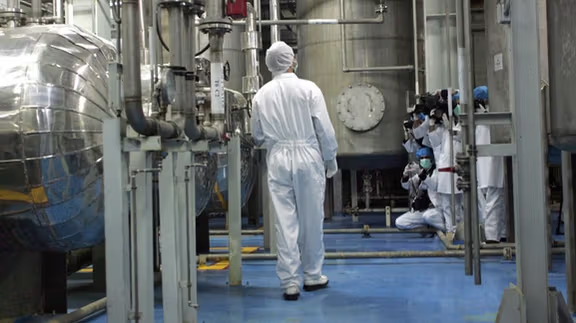
Israel could accept a deal between Iran and the United States if it includes rigorous supervision of Tehran's nuclear program, a senior lawmaker said Saturday.
According to Iranian and Western officials, the Biden administration is holding talks with Iran to sketch out steps that could include limiting the Iranian nuclear program.
These steps would be cast as an "understanding" rather than an agreement requiring review by the US Congress, such as the 2015 accord abandoned in 2018 by then-President Donald Trump.
The Biden administration has repeatedly denied media reports about a deal, acknowledging that contacts were made to clearly convey Washington’s positions. The latest denial came from Secretary of State Antony Blinken on Friday during a press conference.
“With regard to Iran, some of the reports that we’ve seen about an agreement on nuclear matters or, for that matter, on detainees are simply not accurate and not true,” Blinken said.
However, few are convinced that proposals about a deal are not on the table.
"It's not a wide-scope agreement, it's more like a small agreement, a memorandum of understanding, an M.O.U., and I think Israel can live with this if there is real supervision," Yuli Edelstein, head of the Israeli parliament's Foreign Affairs and Defence Committee, told Channel 12's Meet the Press.
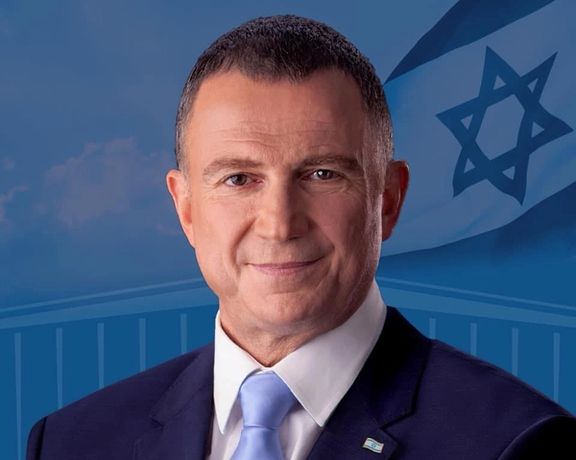
Prime Minister Benjamin Netanyahu's office declined comment on whether fellow Likud party member Edelstein's remarks reflected the views of the premier.
On Tuesday, before briefing the foreign affairs and defense committee, Netanyahu said in televised remarks: "Our position is clear. No agreement with Iran would obligate Israel, which will do everything required to defend itself.
"Our opposition to the deal - a return to the original (2015) deal - is working, I think."
"But there are still differences in outlook, and we do not hide these, regarding smaller agreements too. We have been stating our position clearly, both in closed and open sessions," Netanyahu said.
URANIUM ENRICHMENT
A core element of the possible understanding which remains unclear is the degree to which Iran would agree to rein in its uranium enrichment. Israeli officials in Netanyahu's circle have given potentially differing views on the issue this month.
Netanyahu's national security adviser, Tzachi Hanegbi, said Israel didn't see as much "damage" in any new understanding as there was in the 2015 deal, but it was "poised" for any Iranian shift to more than 60 percent fissile purity.
"That would already be a clear acknowledgment that the uranium enrichment is for weapons needs," Hanegbi said in an interview published on Friday in newspaper Israel Hayom, referring to the 90-percent fissile purity required for a bomb.
But last week, Strategic Affairs Minister Ron Dermer - who accompanied Hanegbi to Washington talks about Iran - voiced misgivings about any "freeze" of current enrichment levels.
"It means that you reconcile with a higher level of enrichment in Iran. And we thought that was a bad idea then, and we think it's a bad idea today," he told the AJC Global Forum in Tel Aviv.
However, Israeli Channel 12 news reported that US Secretary of Defense Lloyd Austin and Israeli Defense Minister Yoav Gallant met Thursday on the sidelines of NATO meeting in Brussels and reached understandings in the light of an emerging nuclear deal between Tehran and Washington.
Having failed to revive the 2015 deal, US President Joe Biden's administration hopes to restore some limits on Iran to keep it from getting a nuclear weapon that could threaten Israel and trigger a regional arms race.
Critics of a limited deal say that Iran would end up keeping the 60-percent enriched uranium, which means the status of a nuclear threshold state, while receiving financial rewards by US allowing other countries to release frozen funds and perhaps some sanctions relief.
Based on reporting by Reuters
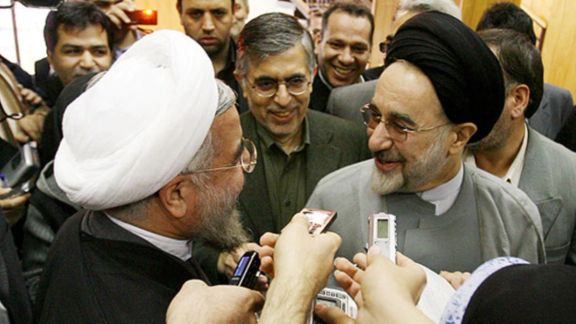
Two of Iran's former presidents, Hassan Rouhani and Mohammad Khatami have highlighted Iran's missed foreign policy opportunities, blaming hardliner conservatives.
Referring to Iran's rapprochement with Saudi Arabia, Rouhani said during a recent meeting with his aides, "It is good that everyone in Iran has understood that you cannot write slogans on missiles, set fire to embassies and make trouble."
Rouhani was referring to the IRGC's behavior following the 2015 JCPOA nuclear deal with the West when they wrote "Death to Israel" on missiles they tested, and the conservative-led vigilantes' behavior in an arson attack on the embassy of Saudi Arabia in January 2016 which led to the severance of ties between Tehran and Riyadh for seven years.
The Obama administration concluded the JCPOA agreement hoping to restrict Iran’s nuclear program and open the door to more moderating diplomatic interaction.
The nuclear deal was concluded during Rouhani’s term in office (2013-2021), who is considered a pragmatist and a moderate compared to many other regime insiders.
But both the permission to conclude the deal and the extremist behavior by hardliners were condoned by Supreme Leader Ali Khamenei. The first was to lift international sanctions, and the second was to continue his anti-West, anti-Israel policies.
Meanwhile, in a reference to the resumption of ties with Saudi Arabia and Supreme Leader Ali Khamenei's recent statement about cooperation with the UN nuclear watchdog IAEA, Rouhani welcomed "the agreements with the IAEA and Saudi Arabia."
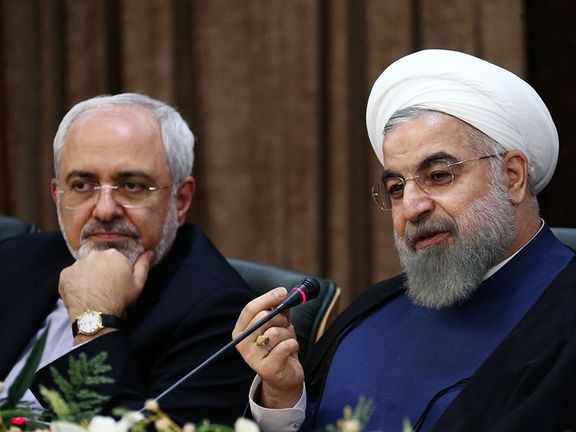
Speaking on domestic politics and the political impasse created by hardliners restricting voters’ choices in parliamentary and presidential elections, Rouhani said: "What determines the country's fate is the people's vote. Everyone in this country acknowledges the power of votes. Without the people's vote we cannot solve any problem."
He added that Iran's population is 85 million and the government should stop keeping only three million of them happy.
Rouhani was alluding to the rule of minority following the consolidation of conservatives' political power after the 2020 parliamentary elections and the 2021 presidential election in which reformist and moderate candidates were barred from running.
Rouhani said: "Five months have passed since the protests in Iran. What have we done during these five months? It is not enough that the streets are calm. We should look for solutions for social problems to prevent further unrest." Nonetheless, he acknowledged that the political situation cannot be corrected overnight as structural changes are required to make the people happy.
Meanwhile, in a message to the congress of the National Development Party, former ‘reformist’ President Mohammad Khatami also pointed out roughly the same issues. Echoing Rouhani, Khatami said: "Had the nuclear deal been revived two years ago, we would have profited substantially. Nonetheless, anything that can improve the situation a little bit is desirable."
Meanwhile, he called on the government to respect the people's views and votes and their right to determine their fate. Khatami said in his message that "there is more fear and concern than hope in the Iranian society today." Like Rouhani, Khatami also advised that "the people need hope, they need to see an improvement in their political and financial situation."
He said the government's new approach to foreign policy that was manifested in the resumption of ties with Saudi Arabia was an example of what is needed to being about positive change in Iran.
Some of Iran's political observers, including Abolfazl Hassanbeigi, a veteran of the Iran-Iraq war and a former populist member of parliament, told a local website that the situation is ripe for rapprochement with the West, adding that US President Joe Biden needs a winning chip for his re-election campaign, even a short-term agreement with Iran.
Hassanbeigi opined that such a short-term and limited agreement will be mutually beneficial for both Iran and the United States. He claimed US officials have realized that their approach to Iran during recent years has weakened the United States and strengthened Iran.